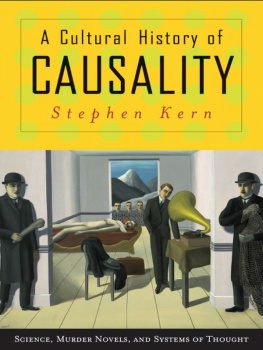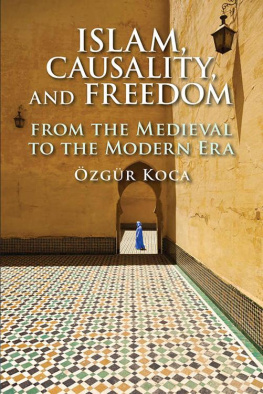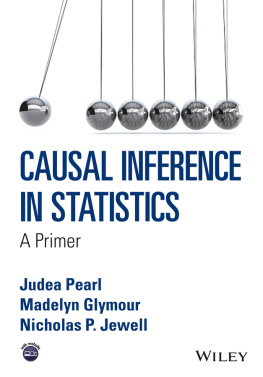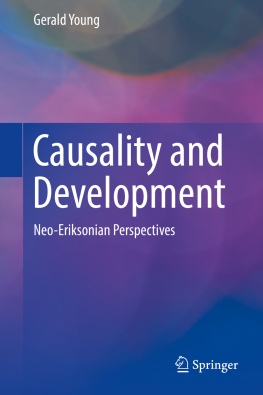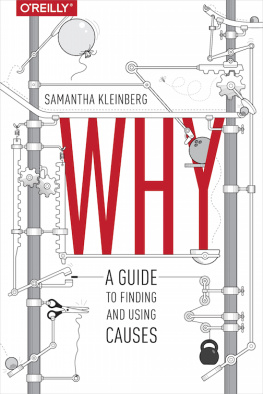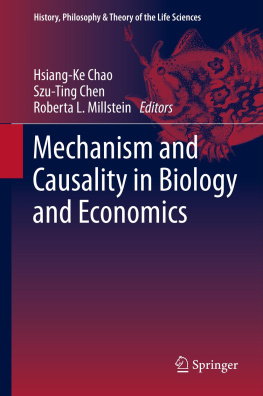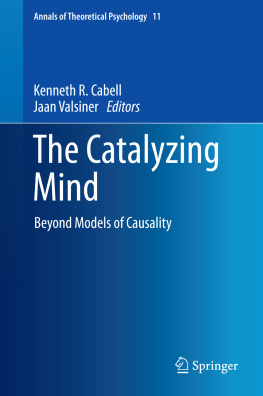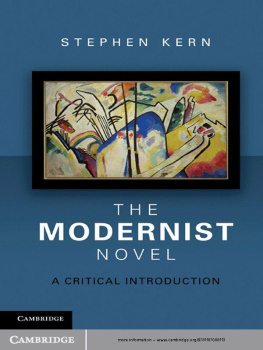A Cultural History of Causality
A Cultural History of Causality
Science, Murder Novels, and Systems of Thought
STEPHEN KERN
PRINCETON UNIVERSITY PRESS
PRINCETON AND OXFORD
Copyright 2004 by Princeton University Press
Published by Princeton University Press, 41 Williams Street,
Princeton, New Jersey 08540
In the United Kingdom: Princeton University Press,
3 Market Place, Woodstock, Oxfordshire OX20 1SY
All Rights Reserved
Library of Congress Cataloging-in-Publication Data
Kern, Stephen.
A cultural history of causality: science, murder novels, and systems of thought / Stephen Kern.
p. cm.
Includes bibliographical references and index.
eISBN: 978-1-40082-623-0
1. Causation in literature. 2. Murder in literature. 3. Causation. 4. Fiction19th centuryHistory and criticism. 5. Fiction20th centuryHistory and criticism. I. Title.
PN56.C38K47 2004
809.93384dc22
2004044676
British Library Cataloging-in-Publication Data is available
This book has been composed in Janson
Printed on acid-free paper. 
pup.princeton.edu
Printed in the United States of America
10 9 8 7 6 5 4 3 2 1
For Mary
Contents
Acknowledgments
SOME OF THE RESEARCH on this book was supported by a National Endowment for the Humanities Fellowship during 19981999 and a sabbatical leave from Northern Illinois University in 2001.
Thanks to Kevin Anderson, Harold Brown, K. Codell Carter, Paul Croce, Otniel Dror, William Everdell, Claudio Fogu, Michael Gelven, Thomas Haskell, Ursula Heise, Linda Henderson, Richard John, David Joravsky, Tomis Kapitan, Gerald Karp, Samuel Kinser, Robert Markley, Richard Metzner, Robert Nye, Laura Otis, Arkady Plotnitsky, Brian Richardson, George Roeder, Ronald Schleifer, and Martin Sklar who read individual chapters relating to their respective areas of expertise. They were an invaluable source of encouragement, direction, and scholarly control. Sander Gilman and Anson Rabinbach read the manuscript in preparing it for press. While writing this book I occasionally felt like Icarus. Robert Brenner was always there to control my altitude but still not limit the broad scope that this undertaking demanded. I am also indebted to my editor, Brigitta van Rheinberg, who supported this project early on and made several key suggestions about its scale and shape. Thanks also to the history department at Ohio State University which gave me a leave of absence during the first year of my tenure there so that I could accept a Guggenheim Fellowship in 20022003 that enabled me to complete the writing.
I am particularly grateful to three people who read all the emerging chapters with meticulous care. Rudolph Binion critiqued my evidence and coherence, Sean Shesgreen tempered my literary voice, while my wife Mary Damer had a keen eye for what did not belong or did not make sense. Over the years it has become increasingly difficult to identify a readership as the field of cultural history moves with the shifting currents of scholarly interest. It has been my great pleasure to share with her on a regular basis the piloting of this book through those rough waters.
Ohio State University
Columbus, Ohio
INTRODUCTION
THE QUESTION behind all other questions is the why? of human experience. The newborns mind gropes for primordial understanding of the causal links between reaching out and human touch, crying and a mothers soothing voice, sucking and relief from hunger. Causal inquiry drives childrens endless why questions as they try to make sense of life. While scientists try to limit themselves to the how of phenomena, an ultimate why lies behind all their observations and experiments. The concept of causality grounds physicists study of subatomic events and astronomers probing of the cosmos. Theologians look to God for ultimate first and final causes, while believers pray to God to modify miraculously the course of everyday causality. Psychiatrists struggle to discover why their patients become ill, just as historians investigate why wars break out and why civilizations rise and fall. Novelists build stories around motivation, which is the driving force for their characters thoughts and actions. Causality is thus a centerpiece of the inquiring human mind, so fundamental to human understanding and so universal in its explanatory function that it would seem to transcend any historical development. This book ventures into such a history.
In the years since 1830, European and American thinkers transformed understanding of the causes of human behavior. These changes are evident in novels as well as in genetics, endocrinology, physiology, medicine, psychiatry, linguistics, sociology, economics, statistics, criminology, law, philosophy, and physics. Other researchers have studied changing ideas about causality in these specific areas, but no one has tackled a broad cultural history of this concept as my book undertakes to do.
The thought of writing a history of causality first occurred to me in 1970, when I read an article by Henri Ellenberger on three types of mental illness that philosophically oriented psychiatrists interpreted in terms of defining causal modes. A causality of determinism dominates the depressed person, for whom everything seems to result from the pressure of circumstances over which he or she has no control. A causality of chance dominates the manic, for whom nothing happens according to any deterministic order and the future looms fraught with possibilityunpredictable and anxiety-provoking. A causality of intentionality dominates the paranoid, for whom nothing is the result of chance and everything is caused by menacing thoughts and deeds directed toward the patient.
Ellenbergers speculation that a mental breakdown might be related to the way causality was experienced suggested the deep constitutive power of causal understanding. His notion that individuals experience causality in different ways suggested that historical eras might experience it and try to understand it in distinctive ways. A literary source base for a history of changing ideas about causality occurred to me when I realized that the novelists who did most to define literary modernismJames Joyce, Marcel Proust, and Virginia Woolfrejected the plot-driven novel and created novels that instead concentrated on the inner life of characters. Their work diminished the role of external pressures and specific motives such as those that had structured the naturalist novels of mile Zola and Thomas Hardy, in which characters are governed by social, biological, and psychological forces. That literary shift suggested a cultural pivot for a history of causality.
But causal factors and motives were too broad a focus, because there are so many of them for countless possible human actions. For more than fifteen years, while working on two other books, I searched for a way to deal with the many causal determinants for the myriad human behaviors that historical experience includes. I eventually realized that such a history would have to focus on a single act in order to document historically distinctive thinking about its causes. But what was that act?
I discovered it in Roy Jay Nelsons study of causality in the French novel, which briefly discussed a novel by Andr Gide, Lafcadios Adventures (1914), about an unusually motivated murder. By focusing on murder, an act that remains relatively consistent over time, I could focus on historically changing ideas about its causal factors. Murder further lends itself to historical analysis because in life and literature after 1830 it attracted increasing attention to its causal circumstances and motives among a number of new professionals: criminologists, sociologists, detectives, statisticians, and forensic psychiatrists, as well as writers of detective fiction (whodunits) and crime novels (whydunits). The history of ideas about the causality of murder over these years also includes a number of new explanatory concepts: monomania, moral insanity, diminished responsibility, irresistible impulse, born criminal, sadism, unconscious determination, and childhood sexual trauma.
Next page
